| Listing 1 - 10 of 10 |
Sort by
|
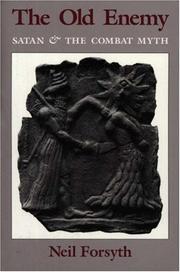
ISBN: 0691014744 Year: 1989 Publisher: Princeton, N.J. Princeton University Press
Abstract | Keywords | Export | Availability | Bookmark
 Loading...
Loading...Choose an application
- Reference Manager
- EndNote
- RefWorks (Direct export to RefWorks)
235.2 --- Kwade engelen. Demonen. Demonologie. Duivel. Satan. Lucifer. Asmodeus. Beëlzebub. Mephistoteles --- 235.2 Kwade engelen. Demonen. Demonologie. Duivel. Satan. Lucifer. Asmodeus. Beëlzebub. Mephistoteles --- Devil --- Comparative studies --- History of doctrines --- Devil in literature --- History and criticism --- Devil - Comparative studies. --- Devil - History of doctrines. --- Devil in literature - History and criticism.
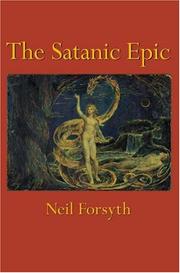
ISBN: 0691113394 0691099960 9786612157691 1282157698 1400825237 9781400825233 9780691113395 9780691099965 9781282157699 6612157690 Year: 2009 Publisher: Princeton, NJ
Abstract | Keywords | Export | Availability | Bookmark
 Loading...
Loading...Choose an application
- Reference Manager
- EndNote
- RefWorks (Direct export to RefWorks)
The Satan of Paradise Lost has fascinated generations of readers. This book attempts to explain how and why Milton's Satan is so seductive. It reasserts the importance of Satan against those who would minimize the poem's sympathy for the devil and thereby make Milton orthodox. Neil Forsyth argues that William Blake got it right when he called Milton a true poet because he was "of the Devils party" even though he set out "to justify the ways of God to men." In seeking to learn why Satan is so alluring, Forsyth ranges over diverse topics--from the origins of evil and the relevance of witchcraft to the status of the poetic narrator, the epic tradition, the nature of love between the sexes, and seventeenth-century astronomy. He considers each of these as Milton introduces them: as Satanic subjects. Satan emerges as the main challenge to Christian belief. It is Satan who questions and wonders and denounces. He is the great doubter who gives voice to many of the arguments that Christianity has provoked from within and without. And by rooting his Satanic reading of Paradise Lost in Biblical and other sources, Forsyth retrieves not only an attractive and heroic Satan but a Milton whose heretical energies are embodied in a Satanic character with a life of his own.
Christian poetry, English --- Devil in literature. --- Epic poetry, English --- Evil in literature. --- Fall of man in literature. --- History and criticism. --- 820 "16" MILTON, JOHN --- -Evil in literature --- -English Christian poetry --- English epic poetry --- Engelse literatuur--17e eeuw. Periode 1600-1699--MILTON, JOHN --- -Engelse literatuur--17e eeuw. Periode 1600-1699--MILTON, JOHN --- 820 "16" MILTON, JOHN Engelse literatuur--17e eeuw. Periode 1600-1699--MILTON, JOHN --- -820 "16" MILTON, JOHN Engelse literatuur--17e eeuw. Periode 1600-1699--MILTON, JOHN --- Devil. --- Evil in literature --- Good in literature --- Milton, John, --- Rubinstein, Anton, --- Characters --- Devil in literature --- Fall of man in literature --- History and criticism --- Milton, John --- Milṭan, Jān, --- Milʹton, Dzhon, --- Милтон, Джон, --- Miltūn, Zhūn, --- Miltonus, Joannes, --- J. M. --- M., J. --- Milʹton, Īoann, --- Milton, Gioanni, --- Milton, Giovanni, --- מילטאן, יאהאן --- מילטאן, יוחנן --- מילטון, ג׳והן --- מלטן, יוחנן --- Good and evil in literature.
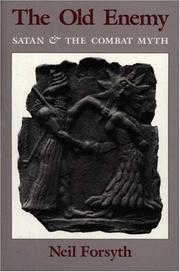
ISBN: 0691067120 0691214603 Year: 1987 Publisher: Princeton, N.J. : Princeton University Press,
Abstract | Keywords | Export | Availability | Bookmark
 Loading...
Loading...Choose an application
- Reference Manager
- EndNote
- RefWorks (Direct export to RefWorks)
The description for this book, The Old Enemy: Satan and the Combat Myth, will be forthcoming.
Devil --- Devil in literature. --- Theomachy. --- Comparative studies. --- History of doctrines. --- Geistesgeschichte Anfänge-500. --- Gott. --- Teufel. --- Djävulen. --- Devil. --- Satan. --- Devil in literature --- History and criticism. --- Beelzebub --- Beelzebul --- Lucifer --- Satan --- Satanael --- Satanail --- Demonology --- Devil as literary characters --- Gotteslehre --- Götter --- Göttin --- Gottesbeweis --- Übernatürliches Wesen --- Luzifer --- Ahura Mazda. --- Allegory. --- Allusion. --- Apocalypse of Adam. --- Apocalyptic literature. --- Apostasy. --- Ashurbanipal. --- Atheism. --- Belial. --- Book of Job. --- Book of Revelation. --- Canaan. --- Christ. --- Christian mythology. --- Christian theology. --- Christian tradition. --- Christian. --- Christianity. --- Church Fathers. --- Cosmogony. --- Covenant theology. --- Creation myth. --- Deity. --- Demiurge. --- Dualism. --- Egyptians. --- Elohim. --- End time. --- Enkidu. --- Enlil. --- Epic of Gilgamesh. --- Epic poetry. --- Epistle to the Ephesians. --- Exegesis. --- Exorcism. --- Ezekiel. --- Fall of man. --- Fallen angel. --- False prophet. --- Flood myth. --- Fornication. --- Gnosticism. --- God. --- Good and evil. --- Greek mythology. --- Hebrew Bible. --- Heresy. --- Humbaba. --- Image of God. --- Irenaeus. --- Israelites. --- Jews. --- Judaism. --- Justin Martyr. --- Life of Adam and Eve. --- Literature. --- Manichaeism. --- Marcion of Sinope. --- Marduk. --- Midrash. --- Monotheism. --- Narrative. --- Neoplatonism. --- New Testament. --- Ninurta. --- Old Testament. --- Omnipotence. --- Origen. --- Pelagianism. --- Philosopher. --- Poetry. --- Polemic. --- Protevangelium. --- Psalms. --- Rahab. --- Religion. --- Religious text. --- Righteousness. --- Samael. --- Samyaza. --- Satanism. --- Sect. --- Septuagint. --- Serpents in the Bible. --- Sheol. --- Sodom and Gomorrah. --- Stumbling block. --- Synoptic Gospels. --- Tertullian. --- The Other Hand. --- Theology. --- Tiamat (Dungeons & Dragons). --- Tiamat. --- Ugarit. --- Wickedness. --- Writing. --- Yahweh. --- Yamm. --- Zoroastrianism.
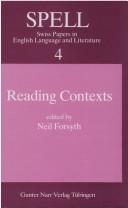
ISBN: 3878088442 Year: 1988 Publisher: Tübingen Narr
Abstract | Keywords | Export | Availability | Bookmark
 Loading...
Loading...Choose an application
- Reference Manager
- EndNote
- RefWorks (Direct export to RefWorks)
Book
ISBN: 0821446479 9780821446478 9780821423363 0821423363 Year: 2019 Publisher: Athens, Ohio
Abstract | Keywords | Export | Availability | Bookmark
 Loading...
Loading...Choose an application
- Reference Manager
- EndNote
- RefWorks (Direct export to RefWorks)
Book
ISBN: 9780691214603 Year: 2020 Publisher: Princeton, NJ
Abstract | Keywords | Export | Availability | Bookmark
 Loading...
Loading...Choose an application
- Reference Manager
- EndNote
- RefWorks (Direct export to RefWorks)
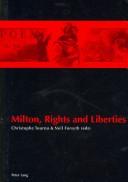
ISBN: 9783039112364 Year: 2007 Publisher: Frankfurt am Main [etc.] Peter Lang
Abstract | Keywords | Export | Availability | Bookmark
 Loading...
Loading...Choose an application
- Reference Manager
- EndNote
- RefWorks (Direct export to RefWorks)
Book
ISBN: 9789078310075 Year: 2010 Publisher: Veldhoven : Tel,
Abstract | Keywords | Export | Availability | Bookmark
 Loading...
Loading...Choose an application
- Reference Manager
- EndNote
- RefWorks (Direct export to RefWorks)
Book
ISBN: 1443823597 9781443823593 9781443823388 1443823384 Year: 2010 Publisher: Newcastle upon Tyne : Cambridge Scholars,
Abstract | Keywords | Export | Availability | Bookmark
 Loading...
Loading...Choose an application
- Reference Manager
- EndNote
- RefWorks (Direct export to RefWorks)
This volume is the result of a collective desire to pay homage to Neil Forsyth, whose work has significantly contributed to scholarship on Satan. This volume is "after" Satan in more ways than one, tracing the afterlife of both the satanic figure in literature and of Neil Forsyth's contribution to the field, particularly in his major books The Old Enemy: Satan and the Combat Myth (Princeton University Press, 1987, revised 1990) and The Satanic Epic (Princeton University Press, 2003). The essa...
Devil in literature. --- Literature --- Appraisal of books --- Books --- Evaluation of literature --- Criticism --- Literary style --- History and criticism. --- Appraisal --- Evaluation
Book

ISBN: 3846763136 Year: 2018 Publisher: Paderborn Brill | Fink
Abstract | Keywords | Export | Availability | Bookmark
 Loading...
Loading...Choose an application
- Reference Manager
- EndNote
- RefWorks (Direct export to RefWorks)
Von der Antike bis an die Schwelle der Moderne wurden politische Ordnungen immer wieder im Rückgriff auf die schillernde Semantik von ,Natur' bestimmt. Was lange Zeit als obsolet galt, erlebt in der politischen Rhetorik unserer Tage eine erstaunliche Renaissance. Durch die Rekonstruktion der politischen Funktionalisierung von Natur in einem weiten Spektrum historischer Fallbeispiele bieten die Beiträge des Bandes eine Archäologie heutiger Debatten. In der Geschichte wurde Natur zum einen als normatives Modell herangezogen, um politische Ordnung zu legitimieren, zum anderen erschien sie als eine anarchische Gegenkraft, die durch politisch-kulturelle Ordnungsleistungen gezähmt werden muss. Zudem gilt: Wer sich in politischen Diskussionen auf Natur beruft, unterstellt Gegebenheiten, die sich menschlicher Verfügungsmacht entziehen. Sowohl aus ihrer Doppeldeutigkeit wie aus dem Phantasma ihrer Unverfügbarkeit gewinnt die Berufungsinstanz Natur in politischen Diskussionen ihre besondere rhetorisch-argumentative Stärke.
Natur --- politische Diskurse --- politische Debatten --- Politik --- Naturalisierung des Politischen --- Natur und Politik
| Listing 1 - 10 of 10 |
Sort by
|

 Search
Search Feedback
Feedback About UniCat
About UniCat  Help
Help News
News